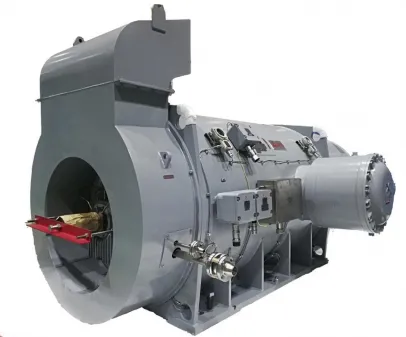In today’s industrial world, electric motors power almost every sector—from mining and metallurgy to oil & gas, chemical processing, and power generation. However, not all environments are the same. While standard motors work effectively under normal conditions, they often face performance limitations in hot, demanding environments. This is where motors for high ambient temperatures become critical.

The fundamental distinction between standard motors and those designed for high-temperature applications lies in their construction and resilience. Standard motors are typically rated for environments up to 40°C. In contrast, high ambient temperature motors are engineered with enhanced insulation systems, specialized cooling designs, and heat-resistant materials that allow them to operate reliably in conditions exceeding 50°C, and in some cases even higher.
This difference in design is not just a technical detail—it directly influences motor longevity, safety, and energy efficiency. Standard motors exposed to extreme heat can suffer insulation breakdown, reduced efficiency, and premature failure. Motors designed for high ambient conditions are built to mitigate these risks, ensuring steady performance in industries where downtime is costly.
Motors for high ambient temperatures are especially vital in industries such as:
Mining and mineral processing where heavy dust and heat are constant challenges.
Oil and gas operations, including drilling and refining, where motors often face extreme climates.
Steel and metallurgy plants, where high radiant heat can degrade standard motor components.
Power plants and cement factories, which demand continuous, heavy-duty operation under hot conditions.
These environments demand not only reliable motors but also additional safety features such as explosion-proof motors to minimize hazards in volatile atmospheres.
Insulation Systems – High-temperature motors use Class H or advanced insulation materials, compared to standard Class B or F insulation in conventional motors.
Cooling Mechanisms – Modified fan designs and heat-dissipating enclosures improve airflow and maintain safe operating temperatures.
Material Strength – Bearings, windings, and housings are upgraded to withstand continuous exposure to elevated heat.
Operational Life – High-temperature motors offer significantly longer service life when placed in harsh conditions compared to standard models.
Safety and Reliability – In hazardous or explosive environments, these motors can be paired with explosion-proof designs for additional protection.
The choice between a standard motor and a high ambient temperature motor often comes down to cost versus reliability. Standard motors may be suitable for controlled, moderate conditions, but when placed in high-heat environments, they can fail prematurely, leading to costly downtime and repairs. On the other hand, while motors for high ambient temperatures may require a slightly higher initial investment, they deliver long-term savings through improved efficiency, safety, and durability.
As industries push the limits of performance, the demand for robust and efficient motor solutions continues to grow. Changli Electric Motor has developed a wide portfolio of industrial motors tailored to meet these challenges. From specialized products built for extreme heat to innovative explosion-proof motors designed for hazardous areas, the company ensures reliable performance in every application.
By leveraging advanced manufacturing techniques and strict quality control, Changli Electric Motor provides customers with trusted solutions that reduce downtime, increase productivity, and extend equipment lifespan. Businesses worldwide can explore more about the company’s offerings at Changli Electric.
When comparing standard motors vs. high ambient temperature motors, the difference is clear: one is suitable for ordinary applications, while the other is indispensable for industries facing extreme heat and demanding conditions. As global industries continue to operate in challenging environments, investing in motors designed for high ambient temperatures is no longer optional—it is essential for safety, efficiency, and long-term success.